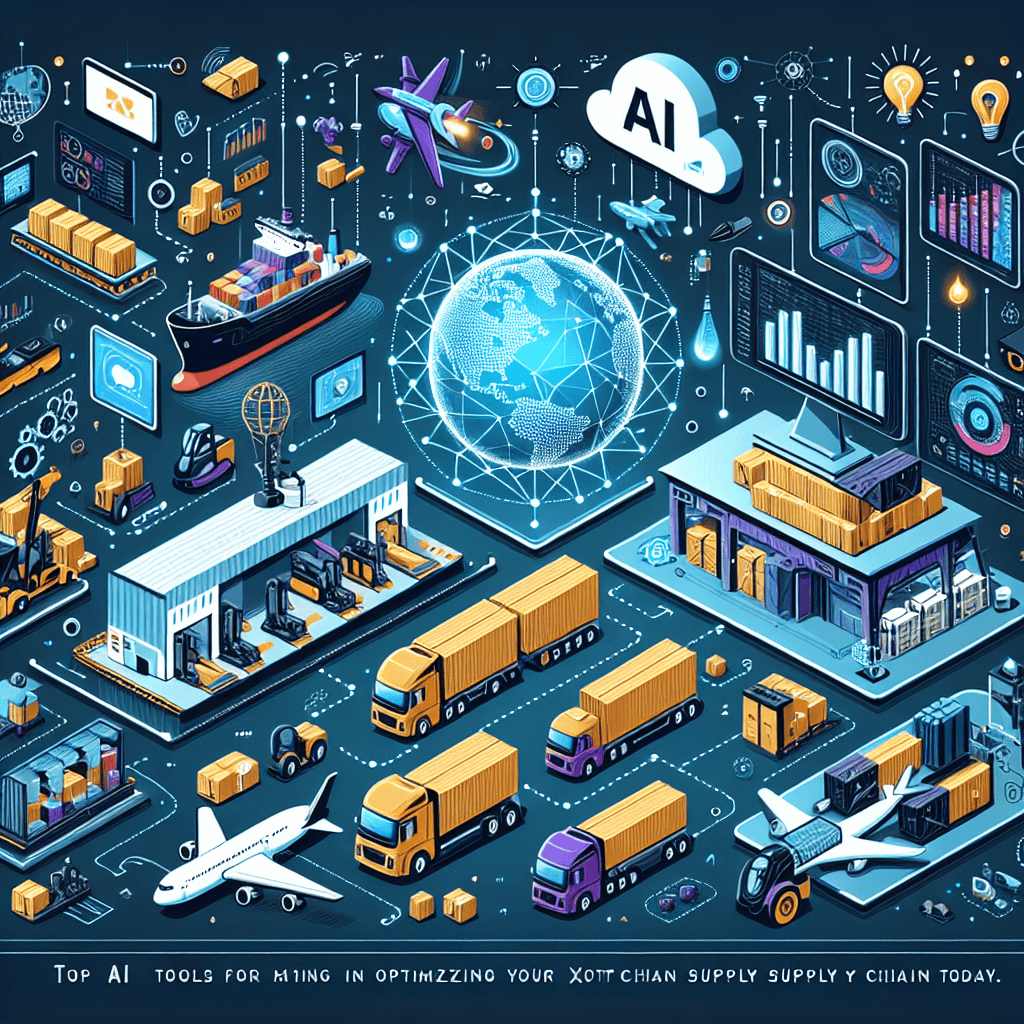Introduction: The Evolution of Supply Chains
In an era defined by rapid technological advancements, businesses across industries are leaning heavily into artificial intelligence (AI) to optimize their supply chains. The supply chain, which consists of the steps involved in getting a product from conception through to delivery, has become more complex than ever. As global demand surges and competition intensifies, leveraging AI tools is not merely advantageous—it’s essential for modern enterprises aiming to sustain their competitive edge.
Unpacking the Bottleneck: Why Supply Chain Optimization Matters
Supply chains are the lifeblood of any organization, impacting everything from customer satisfaction to financial performance. Stagnation in supply chain efficiency can lead to increased operational costs and a significant downturn in customer service. As organizations strive to improve performance and profitability, employing AI technologies has proven transformative. By automating repetitive tasks, predicting trends, and providing actionable insights, AI streamlines operations and enhances decision-making.
The Role of AI in Supply Chain Management
AI’s integration into supply chain management is reshaping business landscapes significantly. These intelligent systems consume vast amounts of data to identify patterns that human analysis might overlook. The insights gleaned from AI help companies in forecasting demand, managing inventory, optimizing logistics, and facilitating smoother vendor relationships, ultimately creating a more resilient supply chain.
Top AI Tools to Boost Your Supply Chain Efficiency
1. IBM Watson Supply Chain
One of the frontrunners in the AI supply chain tool arena, IBM Watson utilizes machine learning algorithms to deliver predictive analytics. By monitoring various data streams, it helps businesses forecast disturbances and adjust regulations accordingly. Companies can enhance their decision-making capabilities while minimizing risks, effectively ensuring smoother operations.
2. SAP Integrated Business Planning
For organizations seeking a holistic solution, SAP Integrated Business Planning stands out. This platform integrates various functionalities like sales and operations planning, demand forecasting, and inventory optimization. Utilizing AI-driven analytics helps organizations stay agile and responsive amidst shifting market demands.
3. Microsoft Azure AI
Microsoft Azure AI empowers users to build custom applications tailored to their unique supply chain requirements. Its flexibility is an advantage for companies in various sectors, enabling them to analyze vast datasets and automate workflows effectively. This adaptability is instrumental in navigating today’s disrupted supply chain landscapes.
4. Oracle Supply Chain Management Cloud
Oracle’s SCM Cloud harnesses AI to enhance efficiency and optimize processes across all stages of the supply chain. It offers tools for everything from demand planning to logistics execution, making it a comprehensive solution for businesses aiming to innovate their supply chain tactics.
5. ClearMetal
With a focus on visibility, ClearMetal utilizes AI to provide a unified view of supply chain inventory, enhancing operational efficiency. The software’s ability to offer insights into stock levels and distribution issues improves end-to-end visibility, allowing companies to anticipate and resolve problems proactively.
6. Llamasoft
Llamasoft’s AI-powered supply chain analytics platform offers tools that emphasize modeling and simulation. Organizations can visualize supply chain scenarios and assess the impact of potential changes before implementing new strategies, reducing risks and enhancing adaptability.
7. Kinaxis RapidResponse
Designed for managing complex supply chains, Kinaxis RapidResponse uses AI to provide real-time insights and scenario planning capabilities. This tool helps businesses quickly navigate fluctuations in demand and supply, promoting increased agility in decision-making processes.
8. Project44
Focusing on logistics, Project44 leverages AI to enhance visibility and real-time tracking of shipments. With an emphasis on predictive analytics, companies can better manage their logistics operations, reduce delays, and ultimately enhance customer satisfaction.
9. Infor CloudSuite
Infor CloudSuite combines cloud technology with AI capabilities to provide a robust supply chain solution. Companies benefit from an extensive suite of tools for managing data, workflows, and communications across their supply chain, promoting seamless collaboration among teams.
10. Blue Yonder
With a focus on retail, Blue Yonder integrates AI and machine learning to optimize inventory and demand forecasting. By harnessing data from multiple sources, it tailors solutions to meet specific business needs, ensuring that products are available when and where they are needed.
Challenges of Implementing AI in Supply Chains
While the benefits of AI are plentiful, implementing these technologies can pose challenges. Data security, integration with existing systems, and employee resistance to change are among the hurdles organizations face. It’s crucial that companies foster a culture of innovation and invest in training to ensure that their teams are prepared to use these advanced tools effectively.
The Future of AI in Supply Chain Management
The future of supply chain management is undoubtedly intertwined with advancements in AI. Businesses that adopt these technologies will likely find themselves ahead of the curve. As machine learning algorithms become increasingly sophisticated, their ability to predict market shifts, manage risks, and optimize resources will be instrumental in enhancing operational efficiency.
Case Study: AI Implementation Successes
Several organizations have successfully transformed their supply chains through AI implementations. For instance, Zara, the global fashion retailer, utilizes AI to analyze customer preferences and inventory levels, which enables them to respond swiftly to trends, thereby reducing lead times and excess inventory.
The Importance of Continuous Evaluation
The rapid pace of technological advancement necessitates that companies continuously evaluate their AI strategies. Regularly revisiting supply chain processes ensures that businesses remain competitive and can adapt to new trends in technology and consumer behavior.
Conclusion: Embracing the AI Revolution
In conclusion, the integration of AI tools into supply chain management is no longer optional; it’s a necessity for companies striving to excel in a dynamic market. From enhancing efficiency to improving customer satisfaction, the advantages are abundant. By embracing these advanced technologies, organizations position themselves not only to survive but thrive in an ever-evolving economic landscape. The time to optimize your supply chain with AI is now.
This article encapsulates the pressing necessity to leverage AI in optimizing supply chains, helping businesses anticipate challenges and respond to opportunities efficiently. With a careful selection of the right AI tools, companies can look forward to a future defined by innovation and sustained growth.








